Investigation: Lack of Management Impact on London Ambulance Service
VerifiedAdded on 2023/01/05
|13
|3606
|64
Report
AI Summary
This report investigates the impact of a lack of management on the organizational growth of the London Ambulance Service. It begins with an introduction and theoretical background, reviewing relevant literature to understand the importance of management and identify reasons for management deficiencies within the LAS. The research aims to analyze the impact of this lack of management, examining its effects on organizational performance. The methodology section outlines the research approach, design, data collection, and analysis methods, including ethical considerations and limitations. The report explores the reasons behind the lack of management at the LAS, identifies strategies to overcome management issues, and evaluates their influence on organizational performance. The findings are presented in relation to the research objectives and questions, offering insights into the challenges faced by the LAS and potential solutions for improving management practices and fostering organizational growth. The report concludes with recommendations for the LAS to enhance its management strategies and improve its overall performance.
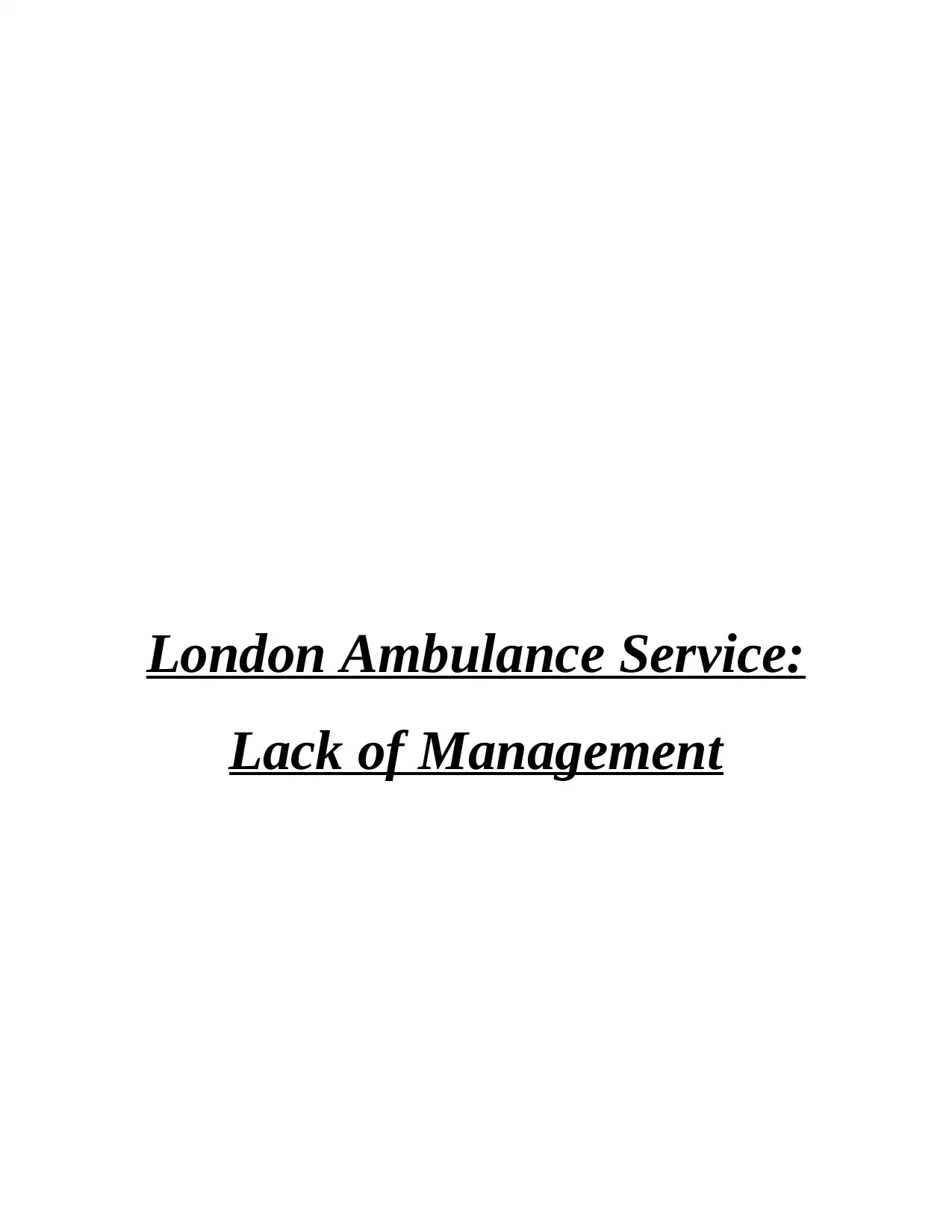
London Ambulance Service:
Lack of Management
Lack of Management
Paraphrase This Document
Need a fresh take? Get an instant paraphrase of this document with our AI Paraphraser
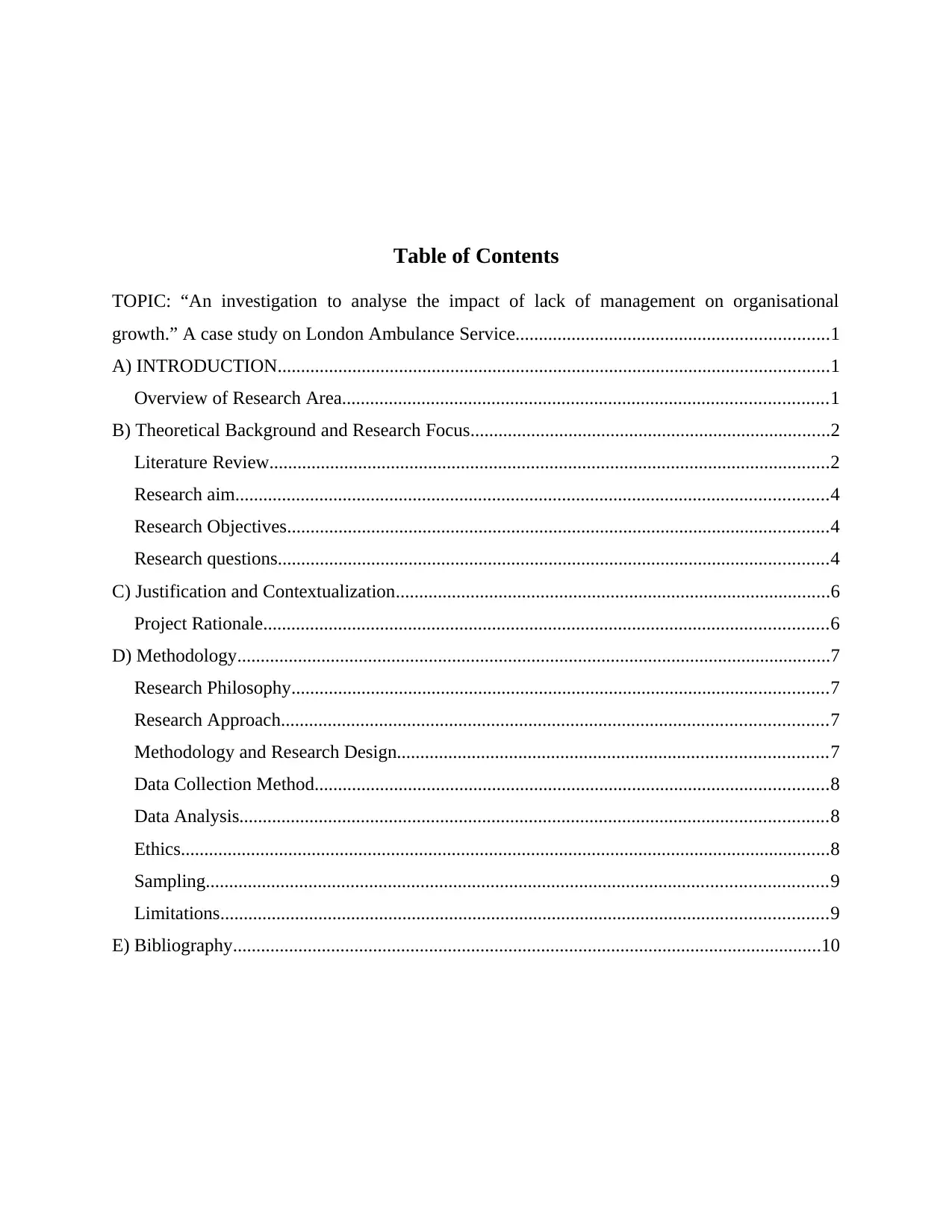
Table of Contents
TOPIC: “An investigation to analyse the impact of lack of management on organisational
growth.” A case study on London Ambulance Service...................................................................1
A) INTRODUCTION......................................................................................................................1
Overview of Research Area........................................................................................................1
B) Theoretical Background and Research Focus.............................................................................2
Literature Review........................................................................................................................2
Research aim...............................................................................................................................4
Research Objectives....................................................................................................................4
Research questions......................................................................................................................4
C) Justification and Contextualization.............................................................................................6
Project Rationale.........................................................................................................................6
D) Methodology...............................................................................................................................7
Research Philosophy...................................................................................................................7
Research Approach.....................................................................................................................7
Methodology and Research Design............................................................................................7
Data Collection Method..............................................................................................................8
Data Analysis..............................................................................................................................8
Ethics...........................................................................................................................................8
Sampling.....................................................................................................................................9
Limitations..................................................................................................................................9
E) Bibliography..............................................................................................................................10
TOPIC: “An investigation to analyse the impact of lack of management on organisational
growth.” A case study on London Ambulance Service...................................................................1
A) INTRODUCTION......................................................................................................................1
Overview of Research Area........................................................................................................1
B) Theoretical Background and Research Focus.............................................................................2
Literature Review........................................................................................................................2
Research aim...............................................................................................................................4
Research Objectives....................................................................................................................4
Research questions......................................................................................................................4
C) Justification and Contextualization.............................................................................................6
Project Rationale.........................................................................................................................6
D) Methodology...............................................................................................................................7
Research Philosophy...................................................................................................................7
Research Approach.....................................................................................................................7
Methodology and Research Design............................................................................................7
Data Collection Method..............................................................................................................8
Data Analysis..............................................................................................................................8
Ethics...........................................................................................................................................8
Sampling.....................................................................................................................................9
Limitations..................................................................................................................................9
E) Bibliography..............................................................................................................................10
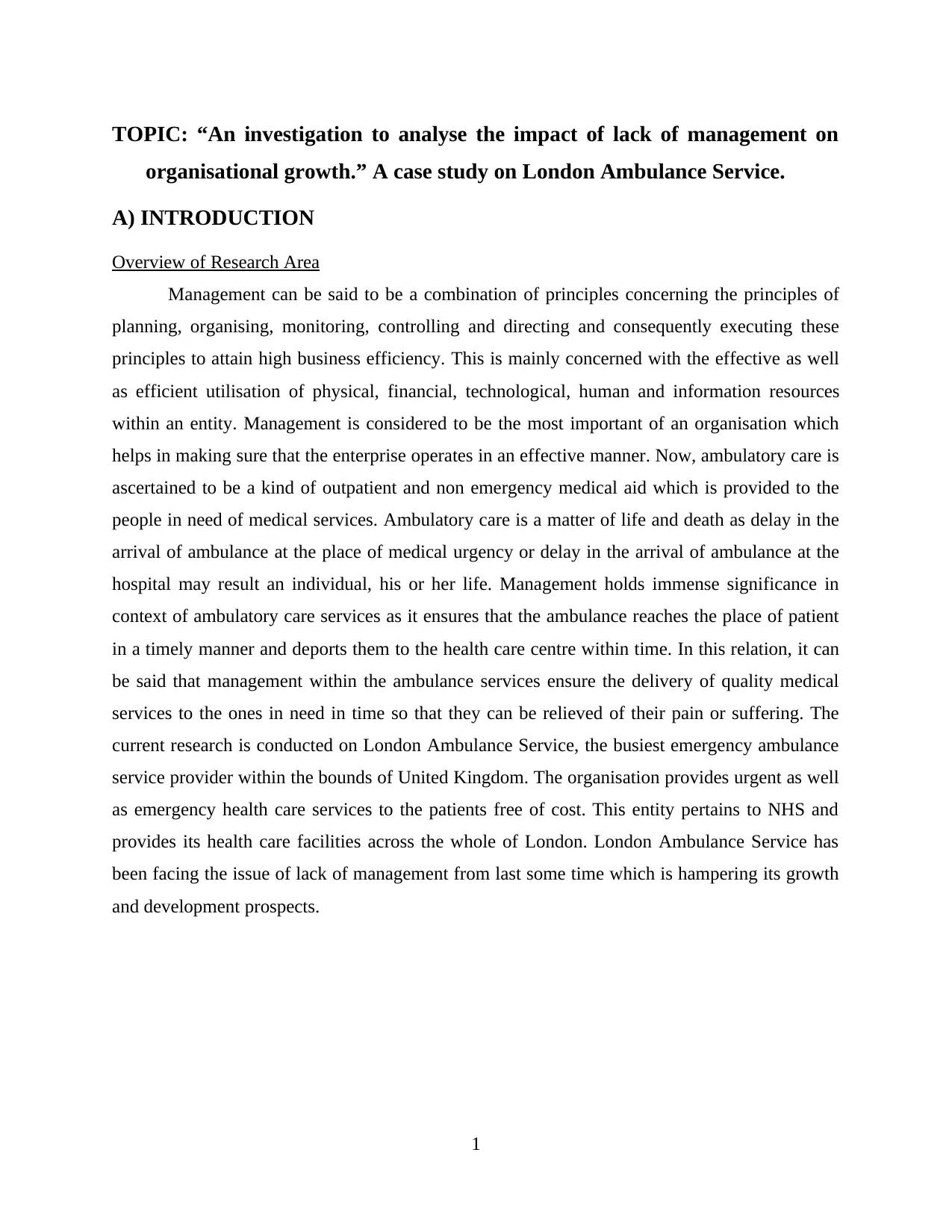
TOPIC: “An investigation to analyse the impact of lack of management on
organisational growth.” A case study on London Ambulance Service.
A) INTRODUCTION
Overview of Research Area
Management can be said to be a combination of principles concerning the principles of
planning, organising, monitoring, controlling and directing and consequently executing these
principles to attain high business efficiency. This is mainly concerned with the effective as well
as efficient utilisation of physical, financial, technological, human and information resources
within an entity. Management is considered to be the most important of an organisation which
helps in making sure that the enterprise operates in an effective manner. Now, ambulatory care is
ascertained to be a kind of outpatient and non emergency medical aid which is provided to the
people in need of medical services. Ambulatory care is a matter of life and death as delay in the
arrival of ambulance at the place of medical urgency or delay in the arrival of ambulance at the
hospital may result an individual, his or her life. Management holds immense significance in
context of ambulatory care services as it ensures that the ambulance reaches the place of patient
in a timely manner and deports them to the health care centre within time. In this relation, it can
be said that management within the ambulance services ensure the delivery of quality medical
services to the ones in need in time so that they can be relieved of their pain or suffering. The
current research is conducted on London Ambulance Service, the busiest emergency ambulance
service provider within the bounds of United Kingdom. The organisation provides urgent as well
as emergency health care services to the patients free of cost. This entity pertains to NHS and
provides its health care facilities across the whole of London. London Ambulance Service has
been facing the issue of lack of management from last some time which is hampering its growth
and development prospects.
1
organisational growth.” A case study on London Ambulance Service.
A) INTRODUCTION
Overview of Research Area
Management can be said to be a combination of principles concerning the principles of
planning, organising, monitoring, controlling and directing and consequently executing these
principles to attain high business efficiency. This is mainly concerned with the effective as well
as efficient utilisation of physical, financial, technological, human and information resources
within an entity. Management is considered to be the most important of an organisation which
helps in making sure that the enterprise operates in an effective manner. Now, ambulatory care is
ascertained to be a kind of outpatient and non emergency medical aid which is provided to the
people in need of medical services. Ambulatory care is a matter of life and death as delay in the
arrival of ambulance at the place of medical urgency or delay in the arrival of ambulance at the
hospital may result an individual, his or her life. Management holds immense significance in
context of ambulatory care services as it ensures that the ambulance reaches the place of patient
in a timely manner and deports them to the health care centre within time. In this relation, it can
be said that management within the ambulance services ensure the delivery of quality medical
services to the ones in need in time so that they can be relieved of their pain or suffering. The
current research is conducted on London Ambulance Service, the busiest emergency ambulance
service provider within the bounds of United Kingdom. The organisation provides urgent as well
as emergency health care services to the patients free of cost. This entity pertains to NHS and
provides its health care facilities across the whole of London. London Ambulance Service has
been facing the issue of lack of management from last some time which is hampering its growth
and development prospects.
1
⊘ This is a preview!⊘
Do you want full access?
Subscribe today to unlock all pages.

Trusted by 1+ million students worldwide
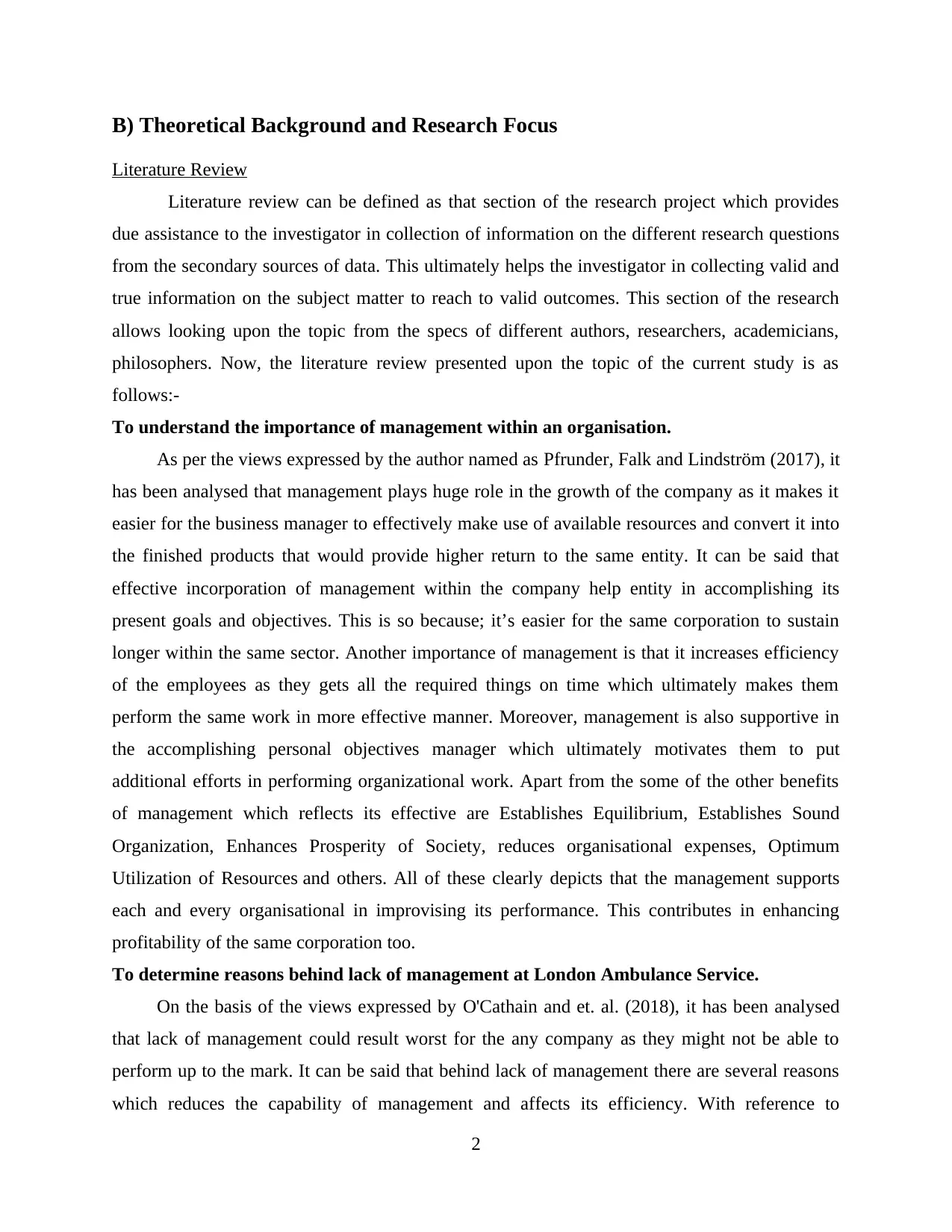
B) Theoretical Background and Research Focus
Literature Review
Literature review can be defined as that section of the research project which provides
due assistance to the investigator in collection of information on the different research questions
from the secondary sources of data. This ultimately helps the investigator in collecting valid and
true information on the subject matter to reach to valid outcomes. This section of the research
allows looking upon the topic from the specs of different authors, researchers, academicians,
philosophers. Now, the literature review presented upon the topic of the current study is as
follows:-
To understand the importance of management within an organisation.
As per the views expressed by the author named as Pfrunder, Falk and Lindström (2017), it
has been analysed that management plays huge role in the growth of the company as it makes it
easier for the business manager to effectively make use of available resources and convert it into
the finished products that would provide higher return to the same entity. It can be said that
effective incorporation of management within the company help entity in accomplishing its
present goals and objectives. This is so because; it’s easier for the same corporation to sustain
longer within the same sector. Another importance of management is that it increases efficiency
of the employees as they gets all the required things on time which ultimately makes them
perform the same work in more effective manner. Moreover, management is also supportive in
the accomplishing personal objectives manager which ultimately motivates them to put
additional efforts in performing organizational work. Apart from the some of the other benefits
of management which reflects its effective are Establishes Equilibrium, Establishes Sound
Organization, Enhances Prosperity of Society, reduces organisational expenses, Optimum
Utilization of Resources and others. All of these clearly depicts that the management supports
each and every organisational in improvising its performance. This contributes in enhancing
profitability of the same corporation too.
To determine reasons behind lack of management at London Ambulance Service.
On the basis of the views expressed by O'Cathain and et. al. (2018), it has been analysed
that lack of management could result worst for the any company as they might not be able to
perform up to the mark. It can be said that behind lack of management there are several reasons
which reduces the capability of management and affects its efficiency. With reference to
2
Literature Review
Literature review can be defined as that section of the research project which provides
due assistance to the investigator in collection of information on the different research questions
from the secondary sources of data. This ultimately helps the investigator in collecting valid and
true information on the subject matter to reach to valid outcomes. This section of the research
allows looking upon the topic from the specs of different authors, researchers, academicians,
philosophers. Now, the literature review presented upon the topic of the current study is as
follows:-
To understand the importance of management within an organisation.
As per the views expressed by the author named as Pfrunder, Falk and Lindström (2017), it
has been analysed that management plays huge role in the growth of the company as it makes it
easier for the business manager to effectively make use of available resources and convert it into
the finished products that would provide higher return to the same entity. It can be said that
effective incorporation of management within the company help entity in accomplishing its
present goals and objectives. This is so because; it’s easier for the same corporation to sustain
longer within the same sector. Another importance of management is that it increases efficiency
of the employees as they gets all the required things on time which ultimately makes them
perform the same work in more effective manner. Moreover, management is also supportive in
the accomplishing personal objectives manager which ultimately motivates them to put
additional efforts in performing organizational work. Apart from the some of the other benefits
of management which reflects its effective are Establishes Equilibrium, Establishes Sound
Organization, Enhances Prosperity of Society, reduces organisational expenses, Optimum
Utilization of Resources and others. All of these clearly depicts that the management supports
each and every organisational in improvising its performance. This contributes in enhancing
profitability of the same corporation too.
To determine reasons behind lack of management at London Ambulance Service.
On the basis of the views expressed by O'Cathain and et. al. (2018), it has been analysed
that lack of management could result worst for the any company as they might not be able to
perform up to the mark. It can be said that behind lack of management there are several reasons
which reduces the capability of management and affects its efficiency. With reference to
2
Paraphrase This Document
Need a fresh take? Get an instant paraphrase of this document with our AI Paraphraser
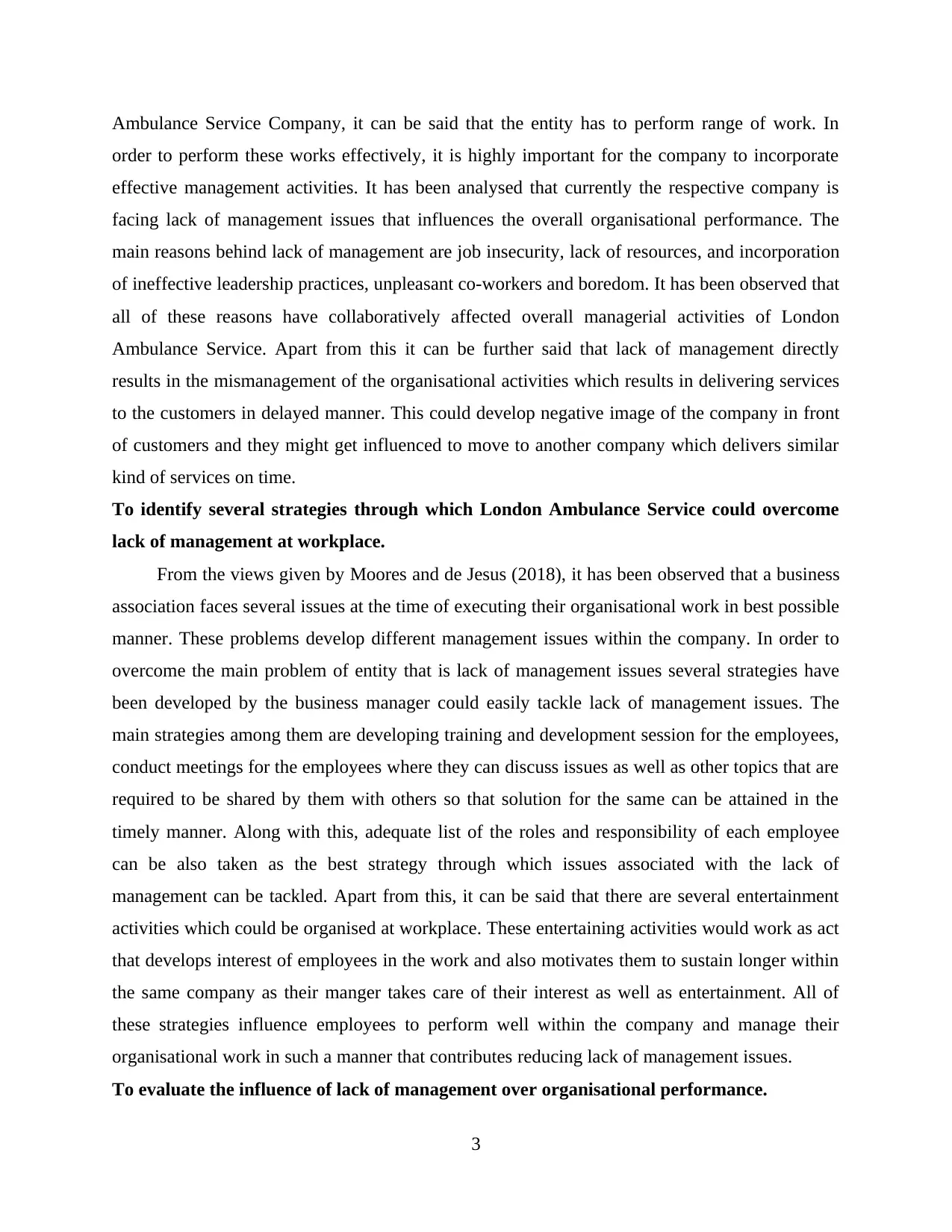
Ambulance Service Company, it can be said that the entity has to perform range of work. In
order to perform these works effectively, it is highly important for the company to incorporate
effective management activities. It has been analysed that currently the respective company is
facing lack of management issues that influences the overall organisational performance. The
main reasons behind lack of management are job insecurity, lack of resources, and incorporation
of ineffective leadership practices, unpleasant co-workers and boredom. It has been observed that
all of these reasons have collaboratively affected overall managerial activities of London
Ambulance Service. Apart from this it can be further said that lack of management directly
results in the mismanagement of the organisational activities which results in delivering services
to the customers in delayed manner. This could develop negative image of the company in front
of customers and they might get influenced to move to another company which delivers similar
kind of services on time.
To identify several strategies through which London Ambulance Service could overcome
lack of management at workplace.
From the views given by Moores and de Jesus (2018), it has been observed that a business
association faces several issues at the time of executing their organisational work in best possible
manner. These problems develop different management issues within the company. In order to
overcome the main problem of entity that is lack of management issues several strategies have
been developed by the business manager could easily tackle lack of management issues. The
main strategies among them are developing training and development session for the employees,
conduct meetings for the employees where they can discuss issues as well as other topics that are
required to be shared by them with others so that solution for the same can be attained in the
timely manner. Along with this, adequate list of the roles and responsibility of each employee
can be also taken as the best strategy through which issues associated with the lack of
management can be tackled. Apart from this, it can be said that there are several entertainment
activities which could be organised at workplace. These entertaining activities would work as act
that develops interest of employees in the work and also motivates them to sustain longer within
the same company as their manger takes care of their interest as well as entertainment. All of
these strategies influence employees to perform well within the company and manage their
organisational work in such a manner that contributes reducing lack of management issues.
To evaluate the influence of lack of management over organisational performance.
3
order to perform these works effectively, it is highly important for the company to incorporate
effective management activities. It has been analysed that currently the respective company is
facing lack of management issues that influences the overall organisational performance. The
main reasons behind lack of management are job insecurity, lack of resources, and incorporation
of ineffective leadership practices, unpleasant co-workers and boredom. It has been observed that
all of these reasons have collaboratively affected overall managerial activities of London
Ambulance Service. Apart from this it can be further said that lack of management directly
results in the mismanagement of the organisational activities which results in delivering services
to the customers in delayed manner. This could develop negative image of the company in front
of customers and they might get influenced to move to another company which delivers similar
kind of services on time.
To identify several strategies through which London Ambulance Service could overcome
lack of management at workplace.
From the views given by Moores and de Jesus (2018), it has been observed that a business
association faces several issues at the time of executing their organisational work in best possible
manner. These problems develop different management issues within the company. In order to
overcome the main problem of entity that is lack of management issues several strategies have
been developed by the business manager could easily tackle lack of management issues. The
main strategies among them are developing training and development session for the employees,
conduct meetings for the employees where they can discuss issues as well as other topics that are
required to be shared by them with others so that solution for the same can be attained in the
timely manner. Along with this, adequate list of the roles and responsibility of each employee
can be also taken as the best strategy through which issues associated with the lack of
management can be tackled. Apart from this, it can be said that there are several entertainment
activities which could be organised at workplace. These entertaining activities would work as act
that develops interest of employees in the work and also motivates them to sustain longer within
the same company as their manger takes care of their interest as well as entertainment. All of
these strategies influence employees to perform well within the company and manage their
organisational work in such a manner that contributes reducing lack of management issues.
To evaluate the influence of lack of management over organisational performance.
3
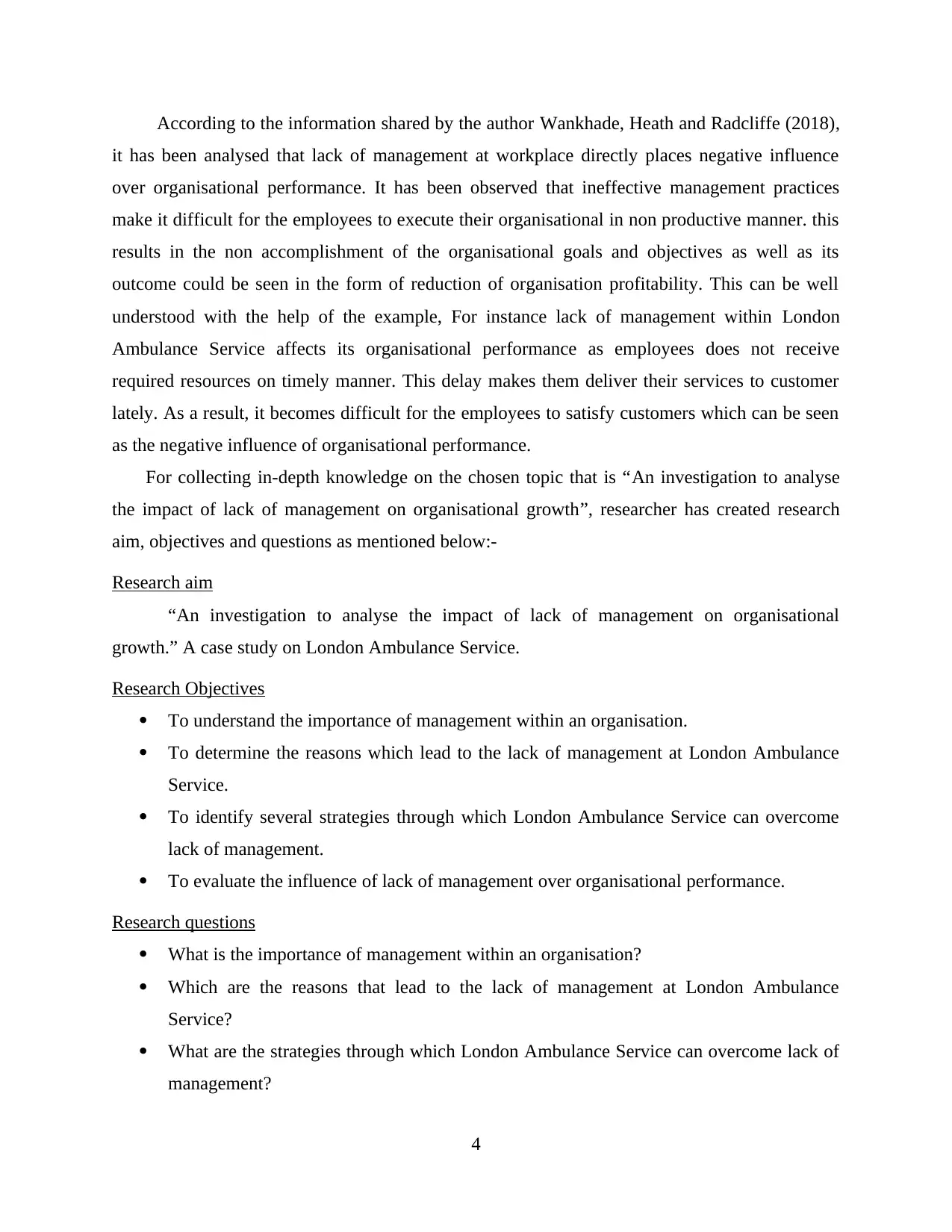
According to the information shared by the author Wankhade, Heath and Radcliffe (2018),
it has been analysed that lack of management at workplace directly places negative influence
over organisational performance. It has been observed that ineffective management practices
make it difficult for the employees to execute their organisational in non productive manner. this
results in the non accomplishment of the organisational goals and objectives as well as its
outcome could be seen in the form of reduction of organisation profitability. This can be well
understood with the help of the example, For instance lack of management within London
Ambulance Service affects its organisational performance as employees does not receive
required resources on timely manner. This delay makes them deliver their services to customer
lately. As a result, it becomes difficult for the employees to satisfy customers which can be seen
as the negative influence of organisational performance.
For collecting in-depth knowledge on the chosen topic that is “An investigation to analyse
the impact of lack of management on organisational growth”, researcher has created research
aim, objectives and questions as mentioned below:-
Research aim
“An investigation to analyse the impact of lack of management on organisational
growth.” A case study on London Ambulance Service.
Research Objectives
To understand the importance of management within an organisation.
To determine the reasons which lead to the lack of management at London Ambulance
Service.
To identify several strategies through which London Ambulance Service can overcome
lack of management.
To evaluate the influence of lack of management over organisational performance.
Research questions
What is the importance of management within an organisation?
Which are the reasons that lead to the lack of management at London Ambulance
Service?
What are the strategies through which London Ambulance Service can overcome lack of
management?
4
it has been analysed that lack of management at workplace directly places negative influence
over organisational performance. It has been observed that ineffective management practices
make it difficult for the employees to execute their organisational in non productive manner. this
results in the non accomplishment of the organisational goals and objectives as well as its
outcome could be seen in the form of reduction of organisation profitability. This can be well
understood with the help of the example, For instance lack of management within London
Ambulance Service affects its organisational performance as employees does not receive
required resources on timely manner. This delay makes them deliver their services to customer
lately. As a result, it becomes difficult for the employees to satisfy customers which can be seen
as the negative influence of organisational performance.
For collecting in-depth knowledge on the chosen topic that is “An investigation to analyse
the impact of lack of management on organisational growth”, researcher has created research
aim, objectives and questions as mentioned below:-
Research aim
“An investigation to analyse the impact of lack of management on organisational
growth.” A case study on London Ambulance Service.
Research Objectives
To understand the importance of management within an organisation.
To determine the reasons which lead to the lack of management at London Ambulance
Service.
To identify several strategies through which London Ambulance Service can overcome
lack of management.
To evaluate the influence of lack of management over organisational performance.
Research questions
What is the importance of management within an organisation?
Which are the reasons that lead to the lack of management at London Ambulance
Service?
What are the strategies through which London Ambulance Service can overcome lack of
management?
4
⊘ This is a preview!⊘
Do you want full access?
Subscribe today to unlock all pages.

Trusted by 1+ million students worldwide

How does the lack of management influence the organisational performance?
5
5
Paraphrase This Document
Need a fresh take? Get an instant paraphrase of this document with our AI Paraphraser
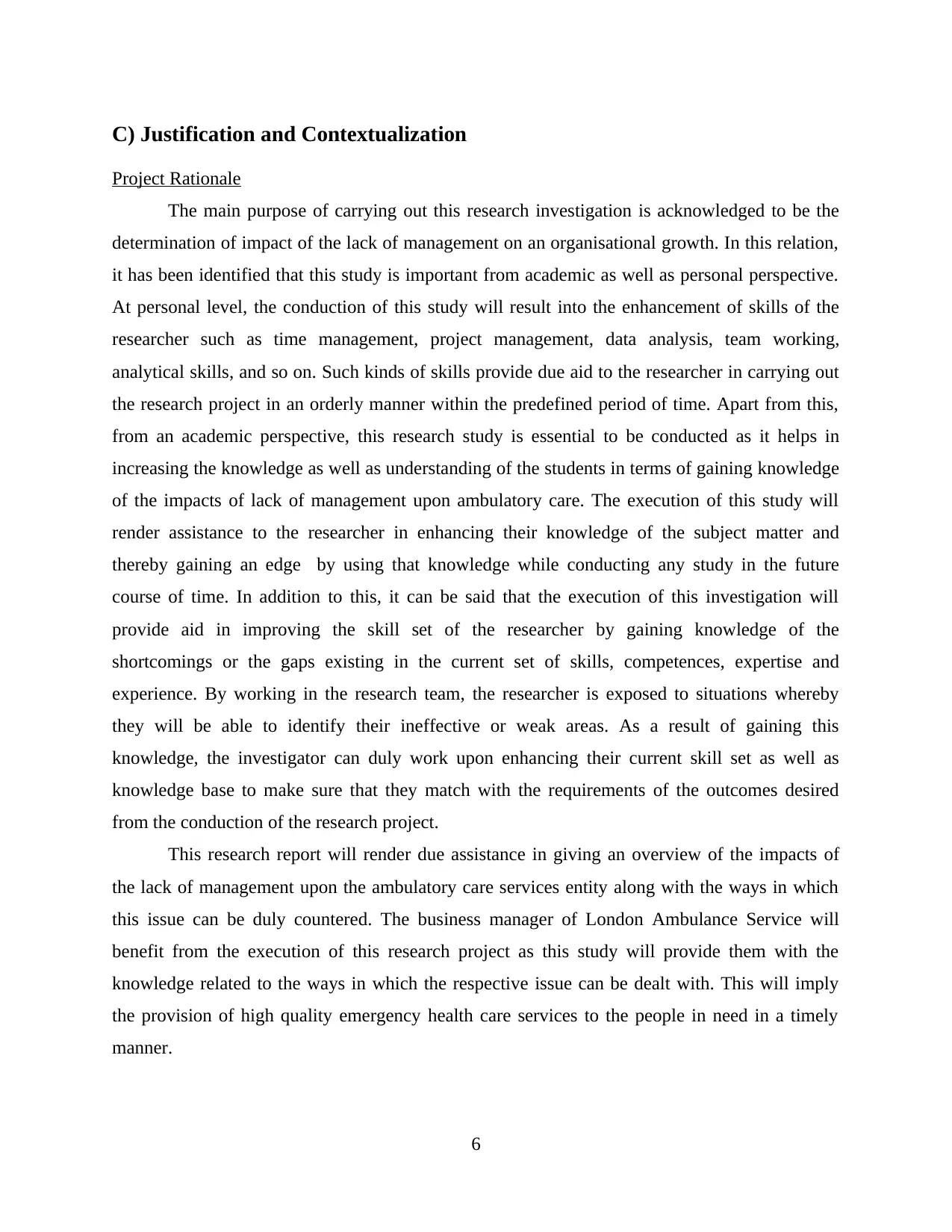
C) Justification and Contextualization
Project Rationale
The main purpose of carrying out this research investigation is acknowledged to be the
determination of impact of the lack of management on an organisational growth. In this relation,
it has been identified that this study is important from academic as well as personal perspective.
At personal level, the conduction of this study will result into the enhancement of skills of the
researcher such as time management, project management, data analysis, team working,
analytical skills, and so on. Such kinds of skills provide due aid to the researcher in carrying out
the research project in an orderly manner within the predefined period of time. Apart from this,
from an academic perspective, this research study is essential to be conducted as it helps in
increasing the knowledge as well as understanding of the students in terms of gaining knowledge
of the impacts of lack of management upon ambulatory care. The execution of this study will
render assistance to the researcher in enhancing their knowledge of the subject matter and
thereby gaining an edge by using that knowledge while conducting any study in the future
course of time. In addition to this, it can be said that the execution of this investigation will
provide aid in improving the skill set of the researcher by gaining knowledge of the
shortcomings or the gaps existing in the current set of skills, competences, expertise and
experience. By working in the research team, the researcher is exposed to situations whereby
they will be able to identify their ineffective or weak areas. As a result of gaining this
knowledge, the investigator can duly work upon enhancing their current skill set as well as
knowledge base to make sure that they match with the requirements of the outcomes desired
from the conduction of the research project.
This research report will render due assistance in giving an overview of the impacts of
the lack of management upon the ambulatory care services entity along with the ways in which
this issue can be duly countered. The business manager of London Ambulance Service will
benefit from the execution of this research project as this study will provide them with the
knowledge related to the ways in which the respective issue can be dealt with. This will imply
the provision of high quality emergency health care services to the people in need in a timely
manner.
6
Project Rationale
The main purpose of carrying out this research investigation is acknowledged to be the
determination of impact of the lack of management on an organisational growth. In this relation,
it has been identified that this study is important from academic as well as personal perspective.
At personal level, the conduction of this study will result into the enhancement of skills of the
researcher such as time management, project management, data analysis, team working,
analytical skills, and so on. Such kinds of skills provide due aid to the researcher in carrying out
the research project in an orderly manner within the predefined period of time. Apart from this,
from an academic perspective, this research study is essential to be conducted as it helps in
increasing the knowledge as well as understanding of the students in terms of gaining knowledge
of the impacts of lack of management upon ambulatory care. The execution of this study will
render assistance to the researcher in enhancing their knowledge of the subject matter and
thereby gaining an edge by using that knowledge while conducting any study in the future
course of time. In addition to this, it can be said that the execution of this investigation will
provide aid in improving the skill set of the researcher by gaining knowledge of the
shortcomings or the gaps existing in the current set of skills, competences, expertise and
experience. By working in the research team, the researcher is exposed to situations whereby
they will be able to identify their ineffective or weak areas. As a result of gaining this
knowledge, the investigator can duly work upon enhancing their current skill set as well as
knowledge base to make sure that they match with the requirements of the outcomes desired
from the conduction of the research project.
This research report will render due assistance in giving an overview of the impacts of
the lack of management upon the ambulatory care services entity along with the ways in which
this issue can be duly countered. The business manager of London Ambulance Service will
benefit from the execution of this research project as this study will provide them with the
knowledge related to the ways in which the respective issue can be dealt with. This will imply
the provision of high quality emergency health care services to the people in need in a timely
manner.
6
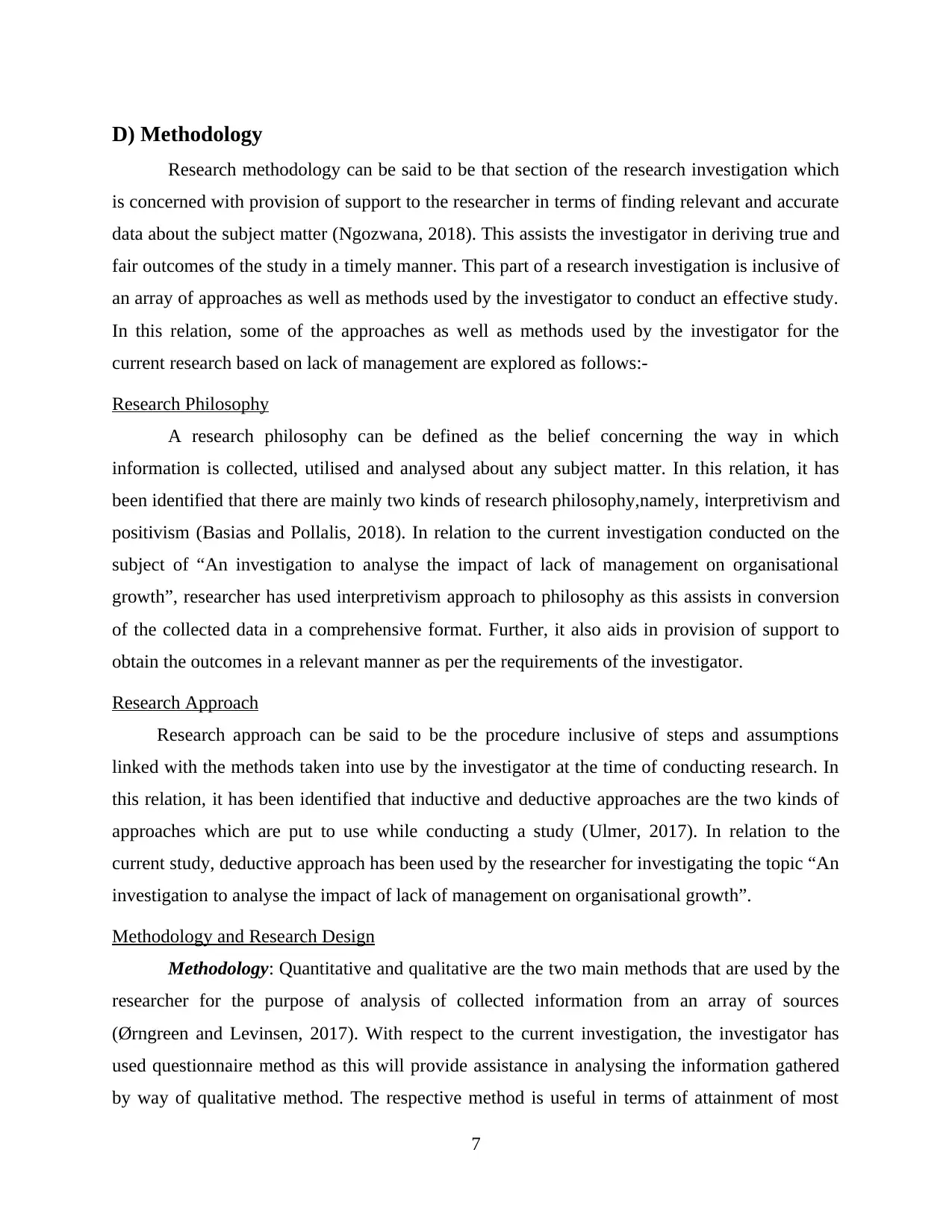
D) Methodology
Research methodology can be said to be that section of the research investigation which
is concerned with provision of support to the researcher in terms of finding relevant and accurate
data about the subject matter (Ngozwana, 2018). This assists the investigator in deriving true and
fair outcomes of the study in a timely manner. This part of a research investigation is inclusive of
an array of approaches as well as methods used by the investigator to conduct an effective study.
In this relation, some of the approaches as well as methods used by the investigator for the
current research based on lack of management are explored as follows:-
Research Philosophy
A research philosophy can be defined as the belief concerning the way in which
information is collected, utilised and analysed about any subject matter. In this relation, it has
been identified that there are mainly two kinds of research philosophy,namely, interpretivism and
positivism (Basias and Pollalis, 2018). In relation to the current investigation conducted on the
subject of “An investigation to analyse the impact of lack of management on organisational
growth”, researcher has used interpretivism approach to philosophy as this assists in conversion
of the collected data in a comprehensive format. Further, it also aids in provision of support to
obtain the outcomes in a relevant manner as per the requirements of the investigator.
Research Approach
Research approach can be said to be the procedure inclusive of steps and assumptions
linked with the methods taken into use by the investigator at the time of conducting research. In
this relation, it has been identified that inductive and deductive approaches are the two kinds of
approaches which are put to use while conducting a study (Ulmer, 2017). In relation to the
current study, deductive approach has been used by the researcher for investigating the topic “An
investigation to analyse the impact of lack of management on organisational growth”.
Methodology and Research Design
Methodology: Quantitative and qualitative are the two main methods that are used by the
researcher for the purpose of analysis of collected information from an array of sources
(Ørngreen and Levinsen, 2017). With respect to the current investigation, the investigator has
used questionnaire method as this will provide assistance in analysing the information gathered
by way of qualitative method. The respective method is useful in terms of attainment of most
7
Research methodology can be said to be that section of the research investigation which
is concerned with provision of support to the researcher in terms of finding relevant and accurate
data about the subject matter (Ngozwana, 2018). This assists the investigator in deriving true and
fair outcomes of the study in a timely manner. This part of a research investigation is inclusive of
an array of approaches as well as methods used by the investigator to conduct an effective study.
In this relation, some of the approaches as well as methods used by the investigator for the
current research based on lack of management are explored as follows:-
Research Philosophy
A research philosophy can be defined as the belief concerning the way in which
information is collected, utilised and analysed about any subject matter. In this relation, it has
been identified that there are mainly two kinds of research philosophy,namely, interpretivism and
positivism (Basias and Pollalis, 2018). In relation to the current investigation conducted on the
subject of “An investigation to analyse the impact of lack of management on organisational
growth”, researcher has used interpretivism approach to philosophy as this assists in conversion
of the collected data in a comprehensive format. Further, it also aids in provision of support to
obtain the outcomes in a relevant manner as per the requirements of the investigator.
Research Approach
Research approach can be said to be the procedure inclusive of steps and assumptions
linked with the methods taken into use by the investigator at the time of conducting research. In
this relation, it has been identified that inductive and deductive approaches are the two kinds of
approaches which are put to use while conducting a study (Ulmer, 2017). In relation to the
current study, deductive approach has been used by the researcher for investigating the topic “An
investigation to analyse the impact of lack of management on organisational growth”.
Methodology and Research Design
Methodology: Quantitative and qualitative are the two main methods that are used by the
researcher for the purpose of analysis of collected information from an array of sources
(Ørngreen and Levinsen, 2017). With respect to the current investigation, the investigator has
used questionnaire method as this will provide assistance in analysing the information gathered
by way of qualitative method. The respective method is useful in terms of attainment of most
7
⊘ This is a preview!⊘
Do you want full access?
Subscribe today to unlock all pages.

Trusted by 1+ million students worldwide
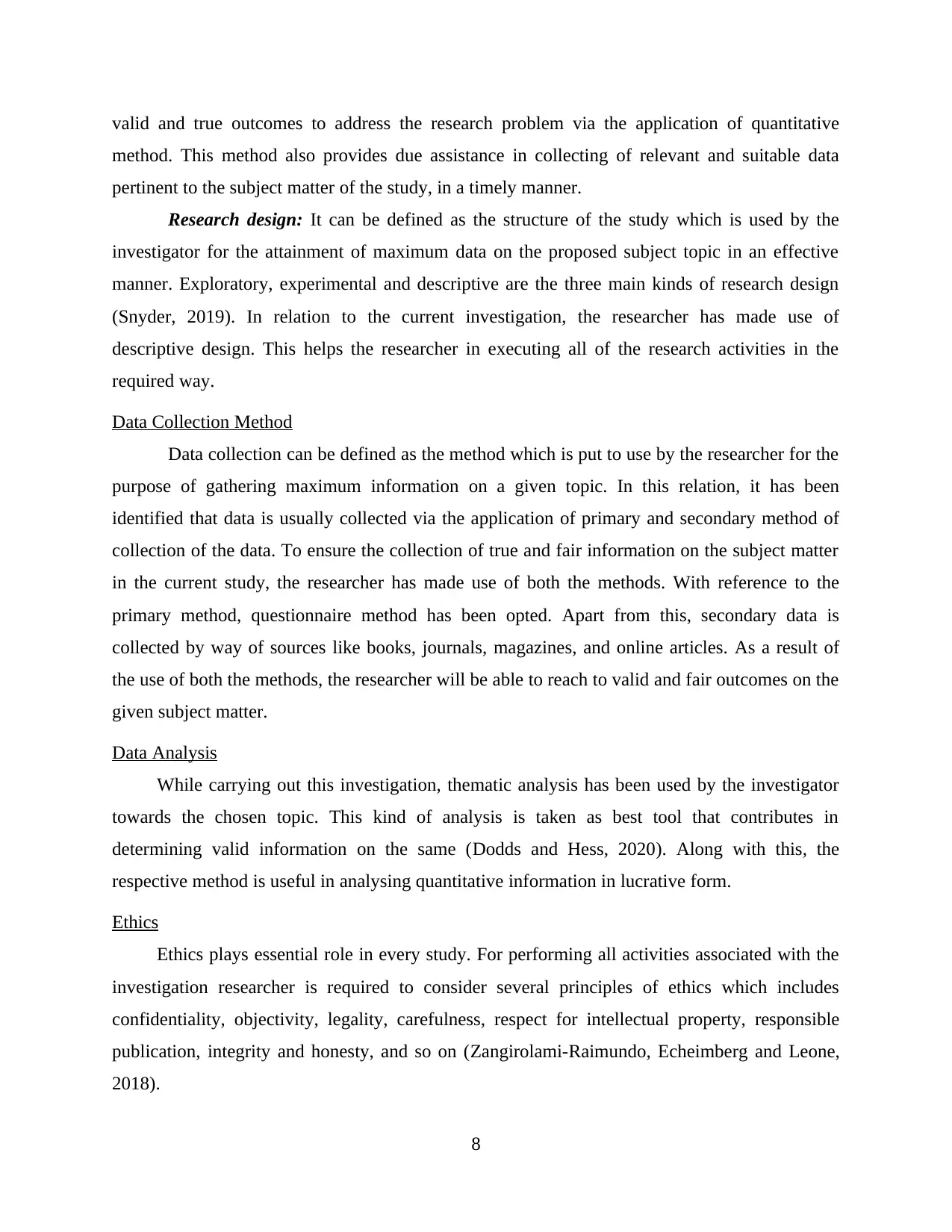
valid and true outcomes to address the research problem via the application of quantitative
method. This method also provides due assistance in collecting of relevant and suitable data
pertinent to the subject matter of the study, in a timely manner.
Research design: It can be defined as the structure of the study which is used by the
investigator for the attainment of maximum data on the proposed subject topic in an effective
manner. Exploratory, experimental and descriptive are the three main kinds of research design
(Snyder, 2019). In relation to the current investigation, the researcher has made use of
descriptive design. This helps the researcher in executing all of the research activities in the
required way.
Data Collection Method
Data collection can be defined as the method which is put to use by the researcher for the
purpose of gathering maximum information on a given topic. In this relation, it has been
identified that data is usually collected via the application of primary and secondary method of
collection of the data. To ensure the collection of true and fair information on the subject matter
in the current study, the researcher has made use of both the methods. With reference to the
primary method, questionnaire method has been opted. Apart from this, secondary data is
collected by way of sources like books, journals, magazines, and online articles. As a result of
the use of both the methods, the researcher will be able to reach to valid and fair outcomes on the
given subject matter.
Data Analysis
While carrying out this investigation, thematic analysis has been used by the investigator
towards the chosen topic. This kind of analysis is taken as best tool that contributes in
determining valid information on the same (Dodds and Hess, 2020). Along with this, the
respective method is useful in analysing quantitative information in lucrative form.
Ethics
Ethics plays essential role in every study. For performing all activities associated with the
investigation researcher is required to consider several principles of ethics which includes
confidentiality, objectivity, legality, carefulness, respect for intellectual property, responsible
publication, integrity and honesty, and so on (Zangirolami-Raimundo, Echeimberg and Leone,
2018).
8
method. This method also provides due assistance in collecting of relevant and suitable data
pertinent to the subject matter of the study, in a timely manner.
Research design: It can be defined as the structure of the study which is used by the
investigator for the attainment of maximum data on the proposed subject topic in an effective
manner. Exploratory, experimental and descriptive are the three main kinds of research design
(Snyder, 2019). In relation to the current investigation, the researcher has made use of
descriptive design. This helps the researcher in executing all of the research activities in the
required way.
Data Collection Method
Data collection can be defined as the method which is put to use by the researcher for the
purpose of gathering maximum information on a given topic. In this relation, it has been
identified that data is usually collected via the application of primary and secondary method of
collection of the data. To ensure the collection of true and fair information on the subject matter
in the current study, the researcher has made use of both the methods. With reference to the
primary method, questionnaire method has been opted. Apart from this, secondary data is
collected by way of sources like books, journals, magazines, and online articles. As a result of
the use of both the methods, the researcher will be able to reach to valid and fair outcomes on the
given subject matter.
Data Analysis
While carrying out this investigation, thematic analysis has been used by the investigator
towards the chosen topic. This kind of analysis is taken as best tool that contributes in
determining valid information on the same (Dodds and Hess, 2020). Along with this, the
respective method is useful in analysing quantitative information in lucrative form.
Ethics
Ethics plays essential role in every study. For performing all activities associated with the
investigation researcher is required to consider several principles of ethics which includes
confidentiality, objectivity, legality, carefulness, respect for intellectual property, responsible
publication, integrity and honesty, and so on (Zangirolami-Raimundo, Echeimberg and Leone,
2018).
8
Paraphrase This Document
Need a fresh take? Get an instant paraphrase of this document with our AI Paraphraser
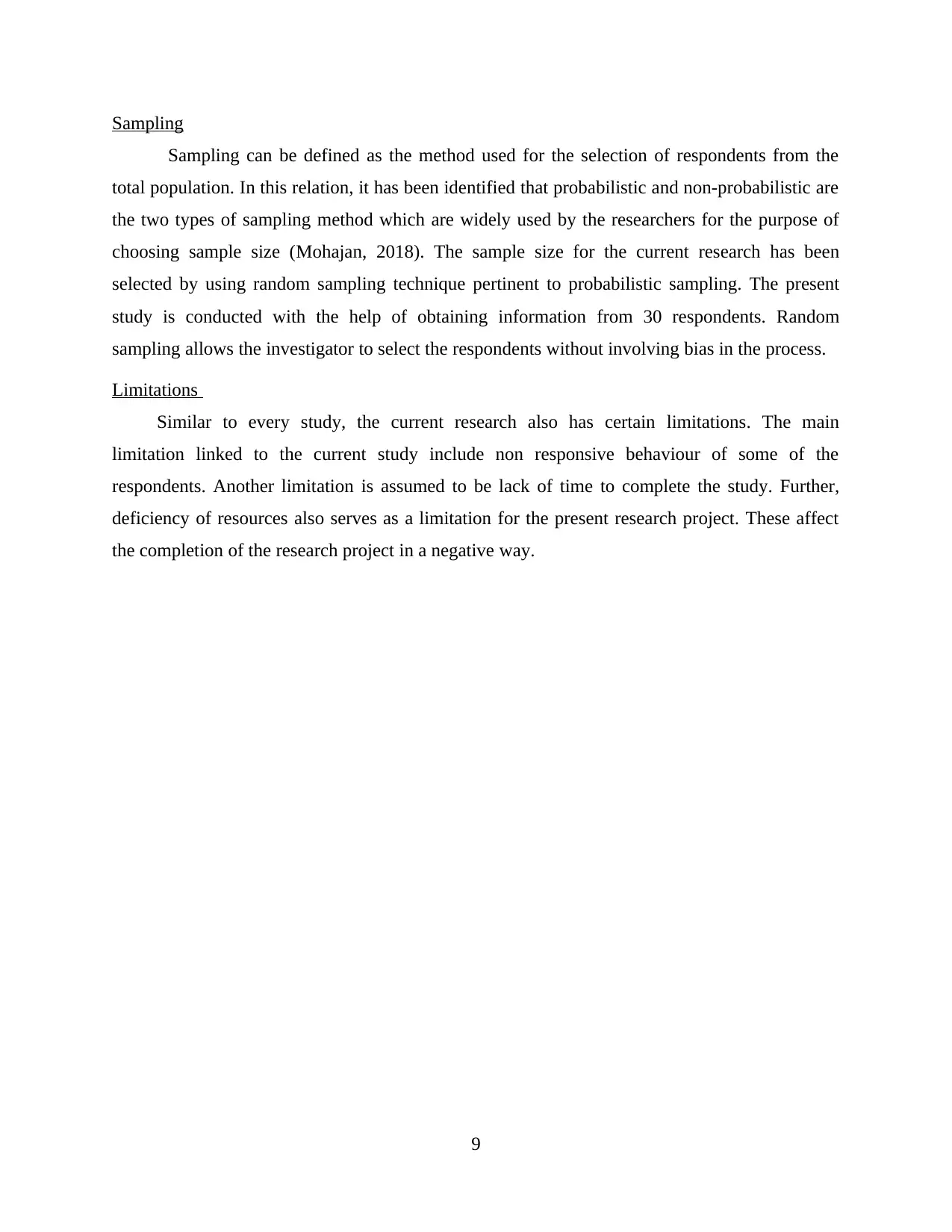
Sampling
Sampling can be defined as the method used for the selection of respondents from the
total population. In this relation, it has been identified that probabilistic and non-probabilistic are
the two types of sampling method which are widely used by the researchers for the purpose of
choosing sample size (Mohajan, 2018). The sample size for the current research has been
selected by using random sampling technique pertinent to probabilistic sampling. The present
study is conducted with the help of obtaining information from 30 respondents. Random
sampling allows the investigator to select the respondents without involving bias in the process.
Limitations
Similar to every study, the current research also has certain limitations. The main
limitation linked to the current study include non responsive behaviour of some of the
respondents. Another limitation is assumed to be lack of time to complete the study. Further,
deficiency of resources also serves as a limitation for the present research project. These affect
the completion of the research project in a negative way.
9
Sampling can be defined as the method used for the selection of respondents from the
total population. In this relation, it has been identified that probabilistic and non-probabilistic are
the two types of sampling method which are widely used by the researchers for the purpose of
choosing sample size (Mohajan, 2018). The sample size for the current research has been
selected by using random sampling technique pertinent to probabilistic sampling. The present
study is conducted with the help of obtaining information from 30 respondents. Random
sampling allows the investigator to select the respondents without involving bias in the process.
Limitations
Similar to every study, the current research also has certain limitations. The main
limitation linked to the current study include non responsive behaviour of some of the
respondents. Another limitation is assumed to be lack of time to complete the study. Further,
deficiency of resources also serves as a limitation for the present research project. These affect
the completion of the research project in a negative way.
9
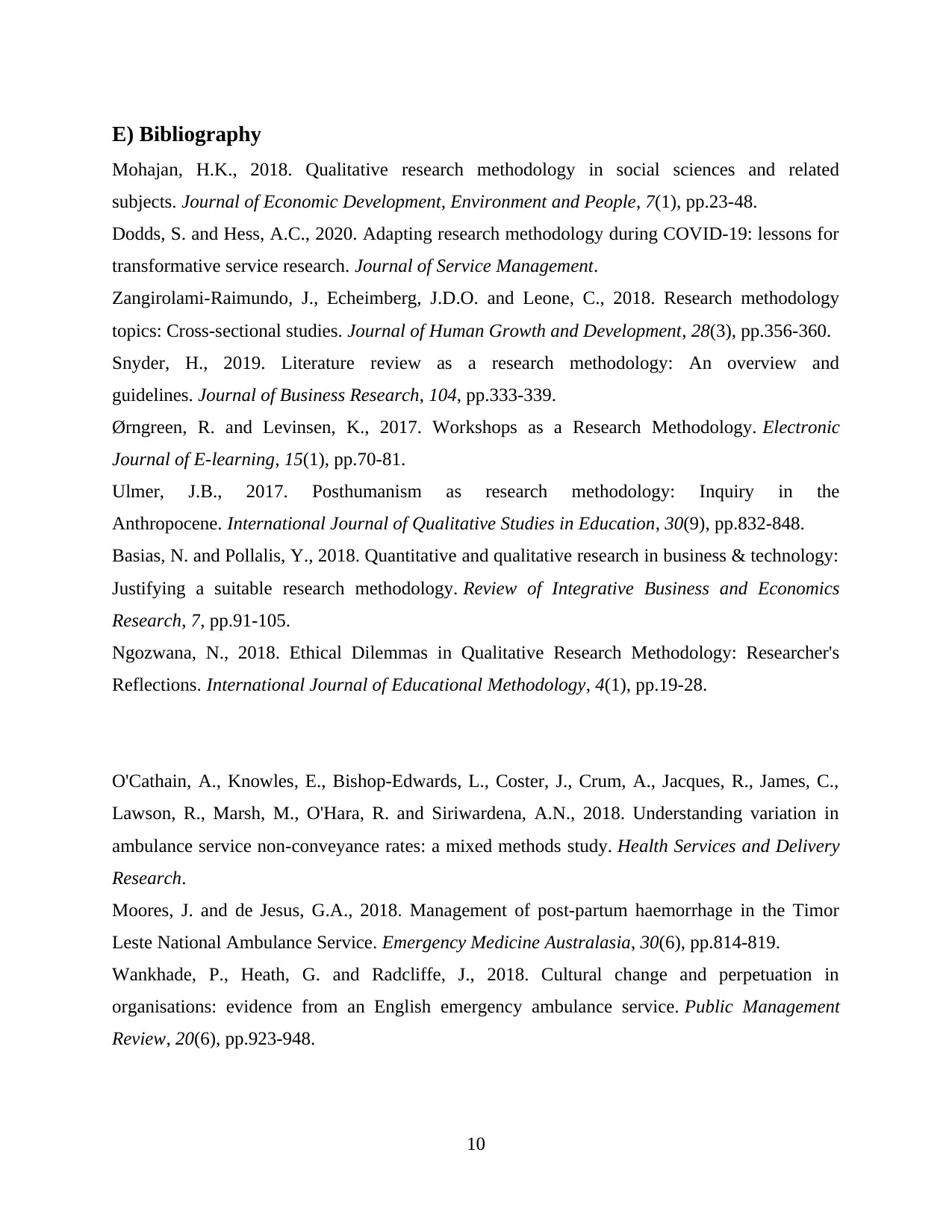
E) Bibliography
Mohajan, H.K., 2018. Qualitative research methodology in social sciences and related
subjects. Journal of Economic Development, Environment and People, 7(1), pp.23-48.
Dodds, S. and Hess, A.C., 2020. Adapting research methodology during COVID-19: lessons for
transformative service research. Journal of Service Management.
Zangirolami-Raimundo, J., Echeimberg, J.D.O. and Leone, C., 2018. Research methodology
topics: Cross-sectional studies. Journal of Human Growth and Development, 28(3), pp.356-360.
Snyder, H., 2019. Literature review as a research methodology: An overview and
guidelines. Journal of Business Research, 104, pp.333-339.
Ørngreen, R. and Levinsen, K., 2017. Workshops as a Research Methodology. Electronic
Journal of E-learning, 15(1), pp.70-81.
Ulmer, J.B., 2017. Posthumanism as research methodology: Inquiry in the
Anthropocene. International Journal of Qualitative Studies in Education, 30(9), pp.832-848.
Basias, N. and Pollalis, Y., 2018. Quantitative and qualitative research in business & technology:
Justifying a suitable research methodology. Review of Integrative Business and Economics
Research, 7, pp.91-105.
Ngozwana, N., 2018. Ethical Dilemmas in Qualitative Research Methodology: Researcher's
Reflections. International Journal of Educational Methodology, 4(1), pp.19-28.
O'Cathain, A., Knowles, E., Bishop-Edwards, L., Coster, J., Crum, A., Jacques, R., James, C.,
Lawson, R., Marsh, M., O'Hara, R. and Siriwardena, A.N., 2018. Understanding variation in
ambulance service non-conveyance rates: a mixed methods study. Health Services and Delivery
Research.
Moores, J. and de Jesus, G.A., 2018. Management of post‐partum haemorrhage in the Timor
Leste National Ambulance Service. Emergency Medicine Australasia, 30(6), pp.814-819.
Wankhade, P., Heath, G. and Radcliffe, J., 2018. Cultural change and perpetuation in
organisations: evidence from an English emergency ambulance service. Public Management
Review, 20(6), pp.923-948.
10
Mohajan, H.K., 2018. Qualitative research methodology in social sciences and related
subjects. Journal of Economic Development, Environment and People, 7(1), pp.23-48.
Dodds, S. and Hess, A.C., 2020. Adapting research methodology during COVID-19: lessons for
transformative service research. Journal of Service Management.
Zangirolami-Raimundo, J., Echeimberg, J.D.O. and Leone, C., 2018. Research methodology
topics: Cross-sectional studies. Journal of Human Growth and Development, 28(3), pp.356-360.
Snyder, H., 2019. Literature review as a research methodology: An overview and
guidelines. Journal of Business Research, 104, pp.333-339.
Ørngreen, R. and Levinsen, K., 2017. Workshops as a Research Methodology. Electronic
Journal of E-learning, 15(1), pp.70-81.
Ulmer, J.B., 2017. Posthumanism as research methodology: Inquiry in the
Anthropocene. International Journal of Qualitative Studies in Education, 30(9), pp.832-848.
Basias, N. and Pollalis, Y., 2018. Quantitative and qualitative research in business & technology:
Justifying a suitable research methodology. Review of Integrative Business and Economics
Research, 7, pp.91-105.
Ngozwana, N., 2018. Ethical Dilemmas in Qualitative Research Methodology: Researcher's
Reflections. International Journal of Educational Methodology, 4(1), pp.19-28.
O'Cathain, A., Knowles, E., Bishop-Edwards, L., Coster, J., Crum, A., Jacques, R., James, C.,
Lawson, R., Marsh, M., O'Hara, R. and Siriwardena, A.N., 2018. Understanding variation in
ambulance service non-conveyance rates: a mixed methods study. Health Services and Delivery
Research.
Moores, J. and de Jesus, G.A., 2018. Management of post‐partum haemorrhage in the Timor
Leste National Ambulance Service. Emergency Medicine Australasia, 30(6), pp.814-819.
Wankhade, P., Heath, G. and Radcliffe, J., 2018. Cultural change and perpetuation in
organisations: evidence from an English emergency ambulance service. Public Management
Review, 20(6), pp.923-948.
10
⊘ This is a preview!⊘
Do you want full access?
Subscribe today to unlock all pages.

Trusted by 1+ million students worldwide
1 out of 13
Related Documents
Your All-in-One AI-Powered Toolkit for Academic Success.
+13062052269
info@desklib.com
Available 24*7 on WhatsApp / Email
![[object Object]](/_next/static/media/star-bottom.7253800d.svg)
Unlock your academic potential
Copyright © 2020–2026 A2Z Services. All Rights Reserved. Developed and managed by ZUCOL.





